Time:2023-06-18 Source: Author: Views:
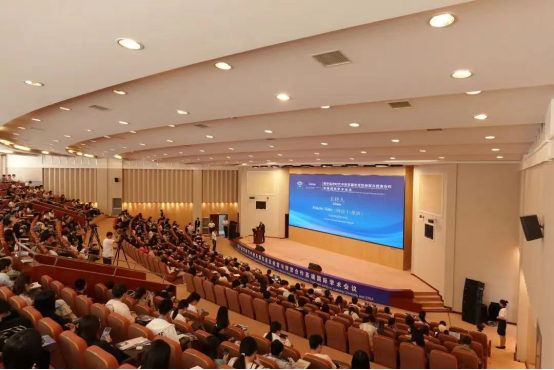
The top-tier international symposium, “Improving ASEAN: East Asia Trade and Investment in Digital Economy Era,” was jointly organized by Liaoning University and the Economic Research Institute for ASEAN and East Asia (ERIA) on June 14 – 15. The symposium, held in Shenyang, was attended by representatives and former officials from ASEAN and its member countries, representatives and experts from relevant international organizations, as well as experts and scholars from domestic government departments, higher education institutions, and research institutes, who gathered to discuss regional economic and trade cooperation in ASEAN and East Asia. Chen Jian, former Vice Minister of the Ministry of Commerce, Le Quang Lan, representative of the ASEAN Secretariat, and Pan Yishan, Party Secretary of Liaoning University, delivered speeches at the opening ceremony. Prof. Yu Miaojie, a deputy of National People’s Congress, Deputy Secretary of the CPC Committee, and President of Liaoning University, presided over the opening ceremony.
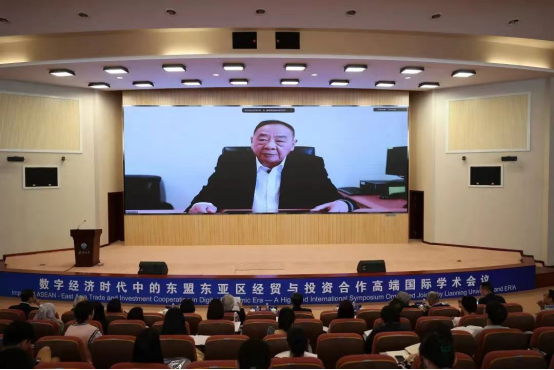
During the opening ceremony, Chen Jian congratulated the symposium on its convening. He strongly affirmed the significant contributions Liaoning University has brought to both national and local economics and social development. Chen stated that, as the only “double first class” construction university in Liaoning Province, Liaoning University has always adhered to leveraging its disciplinary and talent advantages, rooted in the Shenyang and Liaoning region, as a means to serving local development, cultivating a significant number of outstanding talents, and producing numerous influential academic achievements. With its academic strength and influence in the field of economics being widely recognized, Chen hopes that, through the high-level international academic platform established by Liaoning University, further discussions on China’s trade and investment cooperation with ASEAN and East Asia can take place, actively promoting the development of an open economy and pushing China’s economic and trade cooperation with ASEAN and East Asia to new heights.
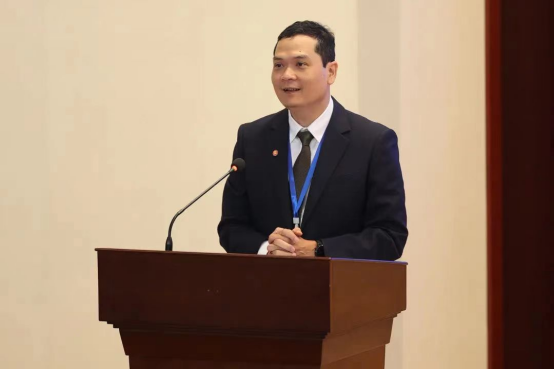
Le Quang Lan, who spoke next, noted in his speech that we are currently riding the wave of the digital economy era, characterized by rapid technological iterations and disruptive innovations. In this environment full of boundless possibilities, the convergence of strengths between ASEAN and China will open unprecedented prospects for further cooperation. He delved into how ASEAN and China can utilize digital collaboration to enhance their economic relations in the future digital age, emphasizing the importance of advancing digital cooperation in areas such as technology assistance, business matchmaking, and capacity building. Le Quang Lam finally expressed his hope that both sides can strengthen their dynamic and multi-dimensional partnership through these efforts.
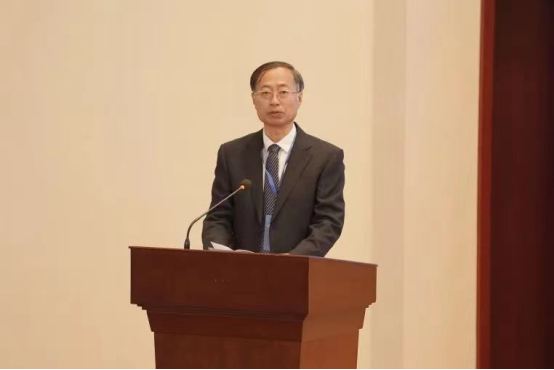
Pan Yishan followed by explaining in his speech how China and ASEAN have been engaged in dialogue for over 30 years, with China and ASEAN countries always maintaining a friendly and cooperative international relationship. Since the beginning of this year, General Secretary Xi Jinping has met with leaders from ASEAN countries, such as Cambodia, Malaysia, and Singapore, reaching a broad consensus on promoting the construction of the “Five Homelands” of China-ASEAN cooperation and advancing ASEAN-China relations. Liaoning University, in collaboration with the ASEAN and East Asia Economic Research Institute, organized a top-tier international academic conference, representing both an implementation of the spirit of the 20th National Congress of the Communist Party of China as well as a decisive action made to promote comprehensive revitalization and breakthroughs in Liaoning’s practice of Chinese-style modernization. Liaoning University is willing to engage in in-depth exchanges with domestic and foreign experts attending the conference, offering suggestions on how China and ASEAN can better promote trade and investment in the digital economy era, thereby driving more attention to the partnership between China and ASEAN and making contributions to further enhance trade and investment relations between China and ASEAN.
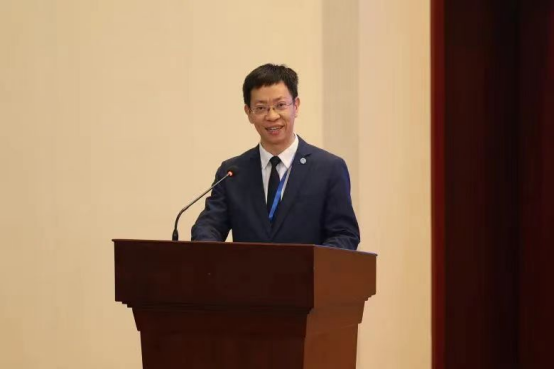
Prof. Yu Miaojie then emphasized in his opening remarks that the theme of “Improving ASEAN: East Asia Trade and Investment in Digital Economy Era” is highly relevant to the comprehensive and strategic partnership between China and ASEAN, which aims to build a meaningful, substantive, and mutually beneficial relationship. He believes that this gathering of experts and collision of ideas will undoubtedly yield more valuable collaborative outcomes. Prof. Yu also expressed his hope that students and faculty at Liaoning University can learn from the experts here, further enhance efforts in building world-class disciplines, continuously strengthen research on major economic and trade issues, and consolidate and strengthen the leading position in the field of economics and trade.
The conference was covered by various media outlets, including Liaoning News, Shenyang News, CRI Online, Liaoning Daily, Northeast News Network, and Shenyang Daily’s Shenyang Release.
Session I: “Asia’s Growth Center”

Aladdin Rillo, former Deputy Secretary-General of ASEAN, chaired the policy discussion of the first session: “Asia’s Growth Center.”
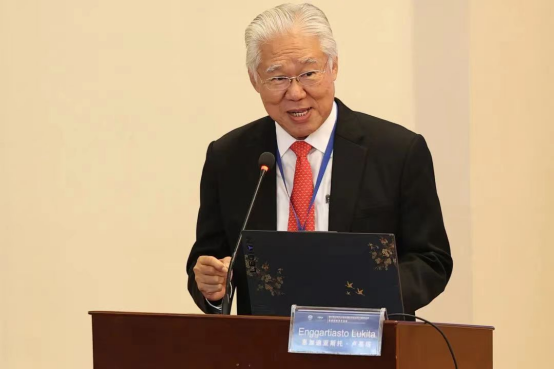
Enggartiasto Lukita, Chairman of B-Universe Media Group and former Minister of Trade of Indonesia, stated that ASEAN has long been committed to regional peace, stability, and prosperity, emphasizing that the countries in Southeast Asia must work together to build harmonious and vibrant partnerships. Faced with the global transformation of supply chains, the widespread application of artificial intelligence, and the development background of emerging geopolitical dynamics, neighboring countries and nations with shared political, security, and economic interests are establishing value-chain clusters. Because of this, China and ASEAN should jointly work towards the development of multilateral agreements, the application of digital technology, and the ASEAN Digital Economy Framework Agreement (DEFA).
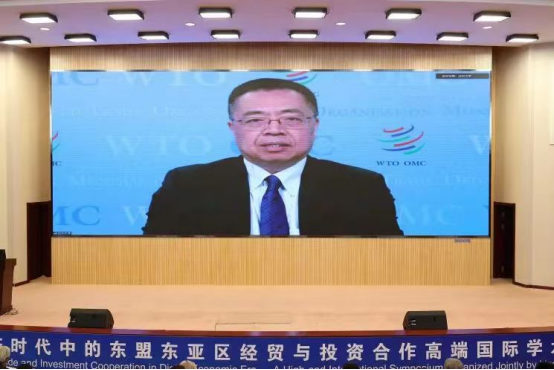
Zhang Xiangchen, former Vice Minister of Commerce of China and current Deputy Director-General of the World Trade Organization (WTO), discussed the trade and investment issues in the era of the digital economy. He mentioned that digital technology has transformed the world, driving economic, innovation, and social development and providing new opportunities for businesses and consumers. However, Zhang stressed how digital technology also brings new challenges, such as data privacy, cybersecurity, cross-border data flow, and localization, all of which require international cooperation to address them.
The WTO is continuously striving to establish an open, transparent, and inclusive global digital trading system and has made substantial achievements in this regard. Because negotiations among the 164 member countries to establish new multilateral trade rules have faced numerous challenges, ASEAN member countries and China play an important role in the formulation of these rules. Concurrently, ASEAN and China are also involved in regional initiatives and bilateral agreements formed to promote digital trade and establish common rules.
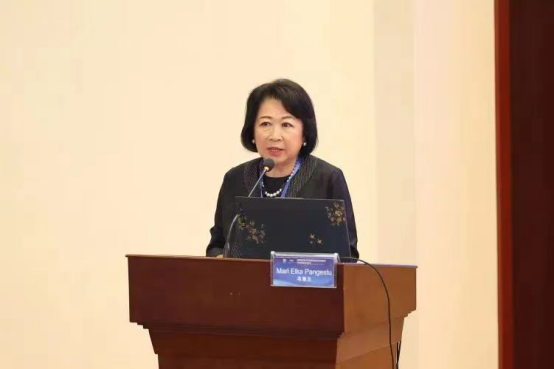
Mari Elka Pangestu, former Managing Director of the World Bank, former Minister of Trade of Indonesia, and former Minister of Tourism and Creative Economy of Indonesia, delivered a keynote speech entitled “Global Economy.” The report was divided into three parts: first, the global challenges and major trade trends facing Asia; second, the prospects and possible policy responses from Asia in the face of these challenges; and third, long-term structural changes needed at the domestic and regional levels.
The main conclusions of Pangestu’s report were as follows: first, the long-term drivers of growth is a significant issue affecting the world and potentially impacting East Asia; second, Asia’s economic growth rate remains at a historical low compared to pre-global financial crisis levels; and third, Asia needs to undergo structural reforms to promote investment, enhance efficiency, and productivity. In addition to domestic policy adjustments, strengthening regional economic integration and political cooperation are both key to ensuring that Asia maintains its epicenter status.
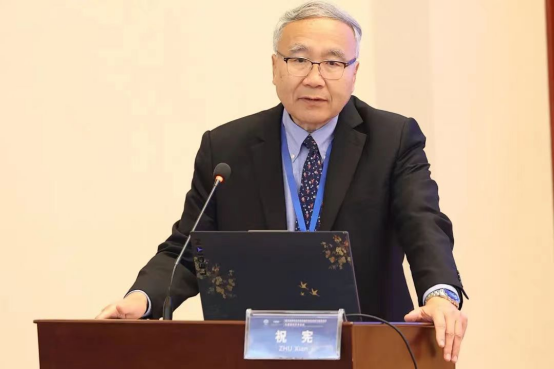
Zhu Xian, former Vice President of the World Bank and current Deputy Chairman and Secretary-General of the International Financial Forum (IFF), elaborated on the risks of fragmented globalization in his discussion on global supply chains, national security interests, and industrial policies. The artificially amplified national security interests and industrial policies have increasingly become important policy instruments for Western countries to intervene in the economy. Zhu believes that the forces of anti-globalization, particularly the unequal distribution of benefits brought about by globalization within countries, are mainly due to multinational companies shifting much of their manufacturing to developing countries with cost advantages, resulting in a hollowing out of domestic industries and rust belts in certain regions, which leads to a significant loss of jobs for blue-collar workers. This structural problem cannot be solved through trade wars or other forms of trade protectionism. However, Western politicians, driven by short-term political considerations and the need to please voters, continue to enact various measures to protect their domestic trade, restrict investment, and hinder the outflow of technology. This has led to the fragmentation of global supply chains. If this trend continues, it will inevitably increase the costs of products and services, impair operational efficiency of businesses, disrupt global supply chains’ investment decisions based on each country’s comparative advantages, and increase inflationary pressures.
In recent years, Zhu noted, major global economies have increasingly emphasized their national economic security interests; in theory, this seems understandable. However, the problem lies in determining clear boundaries for policy measures in order to avoid becoming a sacrifice to short-term domestic political needs. Industrial policies, Zhu added, have always been subject to significant debate. There was a time when Western-developed economies criticized China’s industrial policies for distorting the principles of a free market. Ironically, they are now raising the banner of industrial policy themselves. Throughout history, industrial policies have witnessed both success and failure; they are not a panacea. In relative terms, the experiences of East Asian countries are more worthy of consideration. It is necessary, Zhu emphasized, to have a long-term strategic sense, strong and meticulous execution capabilities, a good interaction between government and enterprises, an avoidance of confrontations with market forces, and an understanding of the time to exit. “I wonder,” Zhu asked as he finished, “if the major Western-developed economies can put aside their pride and humbly learn from others?”
Session II: “Asian Digital Economy”
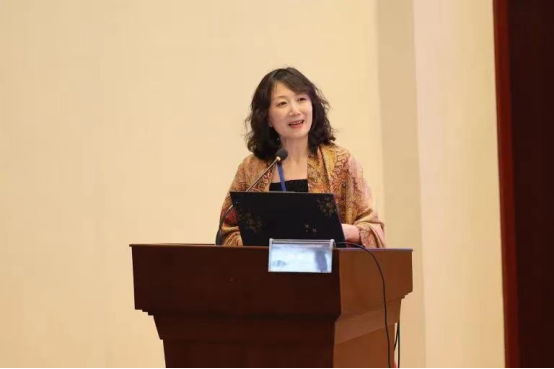
Kong Tao, Senior Researcher at Peking University’s Digital Finance Research Center, chaired the policy discussion on the second session’s theme, “Asian Digital Economy.”
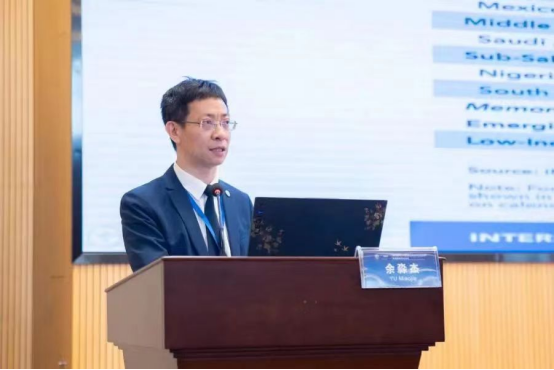
Professor Yu Miaojie, a deputy of National People’s Congress and President of Liaoning University, delivered a keynote speech on “China’s New Development Philosophy,” during which he highlighted the challenges posed by the turbulent international environment and the complex domestic development tasks. However, Prof. Yu emphasized, under the strong leadership of the Party Central Committee and the State Council, China’s economy has embarked on a new journey to achieve Chinese-style modernization. The key to successfully achieving Chinese-style modernization, he stressed, lies in adhering to the new development stage, implementing the “Five Major Development Concepts,” and establishing a new development pattern driven by dual circulation. Prof. Yu presented his ideas on how to accurately and comprehensively implement the “Five Major Development Concepts,” construct a new development pattern of dual circulation, and contribute to the practice of Chinese-style modernization.
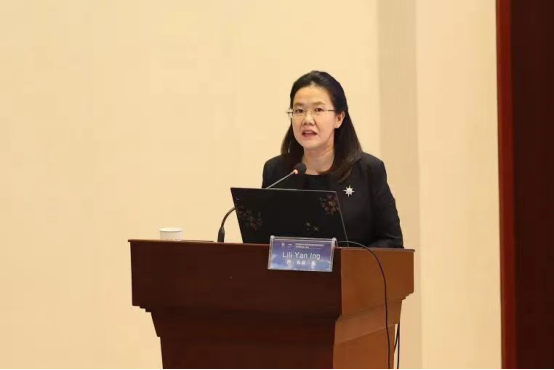
Lili Yan Ing, the Chief Advisor of the Economic Research Institute for ASEAN and East Asia (ERIA) in Southeast Asia, delivered a keynote speech entitled “Latest Developments in ASEAN Digital Trade.” The report covered three aspects: the challenges facing ASEAN digital trade, the framework for ASEAN digital trade, and the prospects for the development of the ASEAN Digital Community by 2045.
The main challenges facing ASEAN digital trade, Yan Ing stated, include data privacy, cybersecurity, competition, and the digital divide. The framework for ASEAN digital trade includes overall trade planning, the ASEAN Digital Integration Framework, the implementation work plan for ASEAN e-commerce agreements, and the ASEAN digital data governance framework.
Building the ASEAN Digital Community by 2045 requires addressing the current challenges through four pillars: firstly, optimizing the use of digital technology to increase economic value across various industries; secondly, managing and regulating the digital economy by protecting personal data, enforcing cybersecurity laws, and promoting interoperability of digital systems; thirdly, integrating inventory, production, delivery, retail platforms, and digital payments to provide support to governments and businesses; and finally, leveraging digital inclusivity to connect all stakeholders and reduce regional and industry disparities.
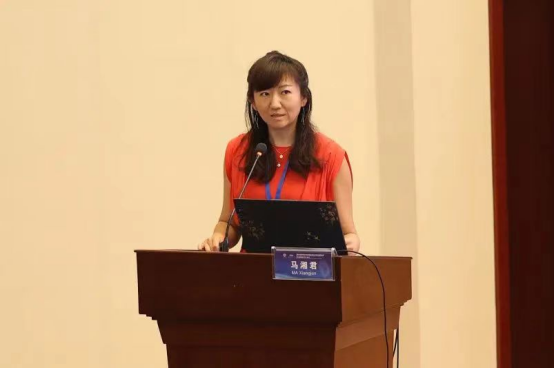
Professor Ma Xiangjun, Deputy Dean of the Research Institute of Chinese Economy at Liaoning University, along with her team consisting of Tian Wei and Prof. Yu Miaojie, presented their research on “Risk and Profit Shifting by Chinese Multinational Enterprises.” They examined how multinational corporations transfer profits to low-tax countries through the transfer of operational risks or intellectual property via related-party transactions. Using micro-level data from Chinese industrial enterprises, they found that when the corporate income tax rate difference between China and the host country increases, both the risks and profits retained by Chinese parent companies decrease. This effect is particularly significant among companies with high levels of intangible assets. According to their estimates, this results in an annual income tax loss in China of approximately 65 billion yuan, with a relatively lower profit shifting extent compared to developed countries.
Session III: “Infrastructure Construction: Asia’s Growth Center”
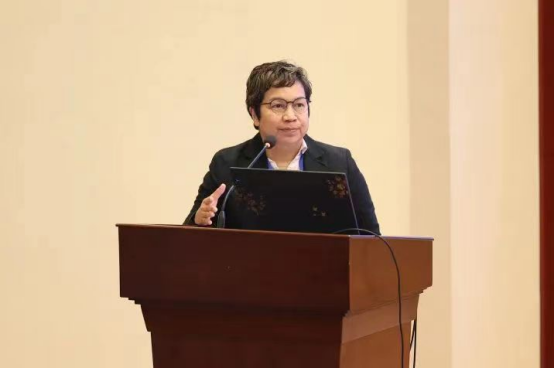
Fauziah Zen, Senior Economist of ERIA and Senior Lecturer at Universitas Indonesia, chaired a policy discussion on the third session entitled “Infrastructure Construction: Asia’s Digital Connectivity.”
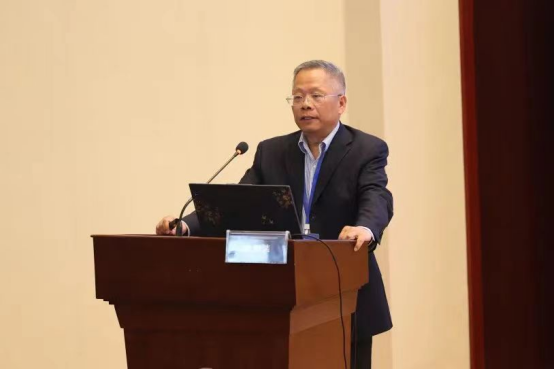
Professor Yao Shujie, Vice Chairman of the Academic Committee of Liaoning University and Director of the Li’anmin Institute of Economics, discussed the impact of digital infrastructure utilization and digital trade development on China-ASEAN bilateral trade. Prof. Yao pointed out that ASEAN is China’s largest trading partner, primarily due to its proximity to China and similar historical, cultural, and linguistic characteristics. Furthermore, both ASEAN and China’s economies have experienced rapid development since the turn of the century, creating strong complementarity in bilateral trade. In 2021, ASEAN surpassed the European Union and the United States in becoming China’s largest trading partner. The tariff actions taken by the United States against China in recent years have accelerated China’s diversification of trading destinations, resulting in a continuous decline in the share of the United States in China’s foreign trade and a continuous increase in the share of ASEAN. ASEAN countries have utilized digital technology to significantly promote their import and export trade with the world and China. On the other hand, while China’s digital trade has significantly increased its exports to ASEAN, this has had a less significant impact on imports from ASEAN. Prof. Yao stressed that both China and ASEAN countries need to reduce transaction costs and improve trade efficiency through technological innovation, especially in data technology and its extensive applications. There is a strong complementarity between China and ASEAN in the field of digital technology and its applications, indicating broad prospects for cooperation.
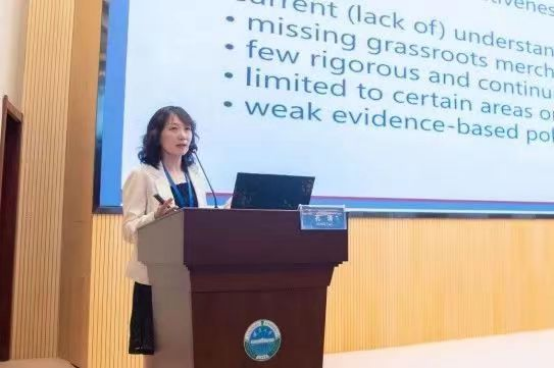
Professor Kong Tao, Senior Researcher at the Digital Finance Research Center of Peking University, discussed the question: “How can Chinese micro- and small-business owners respond to the pandemic?” Prof. Kong noted that while micro- and small-business owners are the capillaries of China’s economy, there remains a lack of research based on micro-level data for this group. Since mid-2020, Peking University, together with Ant Research Institute and WeBank, have been conducting quarterly surveys on China’s micro- and small-business owners. Based on an analysis of approximately 150,000 samples of micro- and small-business owners over the past 11 quarters, this led to the following findings: that during the pandemic, micro and small businesses have shown fluctuating performance, with a significant impact in 2022; that insufficient market demand and high operating costs continue to be pain points for these businesses, with increasing pressure from policy uncertainties at the end of 2022; that there has been a steady increase in the digitalization level of micro and small businesses, with online multi-platform operations and the use of electronic information systems becoming new trends; that online financing channels have become the primary means of obtaining loans for these businesses, with declining financing costs from financial institutions; that the coverage of supportive policies has steadily increased, with over 40% of micro- and small-business owners benefiting from at least one form of support; and, finally, that there are signs of confidence stabilization as indicated by the overall confidence index, with over 80% of micro- and small-business owners expressing confidence in their business prospects for the entire year of 2023.
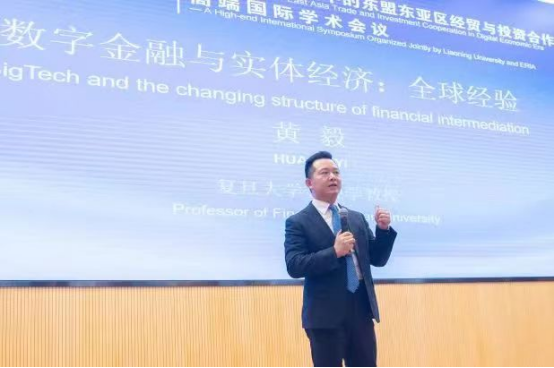
Professor Huang Yi from Fudan University explained the impact of digital finance on the real economy, as well as future implications for the banking industry and market competition, under his topic entitled “Digital Finance and the Real Economy: Global Experiences,” providing insights from both developed and developing countries worldwide. Firstly, Prof. Huang stated, digital finance emerges due to various business scenarios and relates to the traditional financial challenges of information asymmetry, long-tail coverage, and pre-regulation. Secondly, compared to traditional data or data processing methods, digital finance-lending institutions have an information advantage, particularly in assessing the creditworthiness of borrowers. Specifically, Prof. Huang noted, these institutions leverage informational advantages through data or technological means, incorporating financial innovations such as machine learning and big data algorithms to offer inclusive financial services.
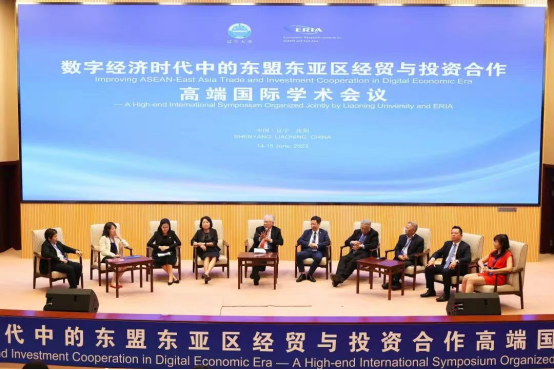
The symposium was conducted through a combination of online and offline formats. Throughout the event, experts and scholars from ASEAN member countries, relevant international organizations, academia, and policy research fields engaged in lively discussions that greatly promoted academic exchanges and scientific research cooperation. Overall, the symposium has offered new ideas, explored new models, and achieved new results in advancing research and practices in regional economic and trade cooperation.
Chongshan Campus: No. 66, Chongshan Middle Road, Huanggu District, Shenyang Postcode: 110036
Puhe Campus: No. 58, Daoyi South Street, Shenbei New District, Shenyang Postcode: 110136
Wusheng Campus: No. 38 Youth Street, Baita District, Liaoyang City Zip code: 111000
Copyright by Liaoning University, Shenyang, China
